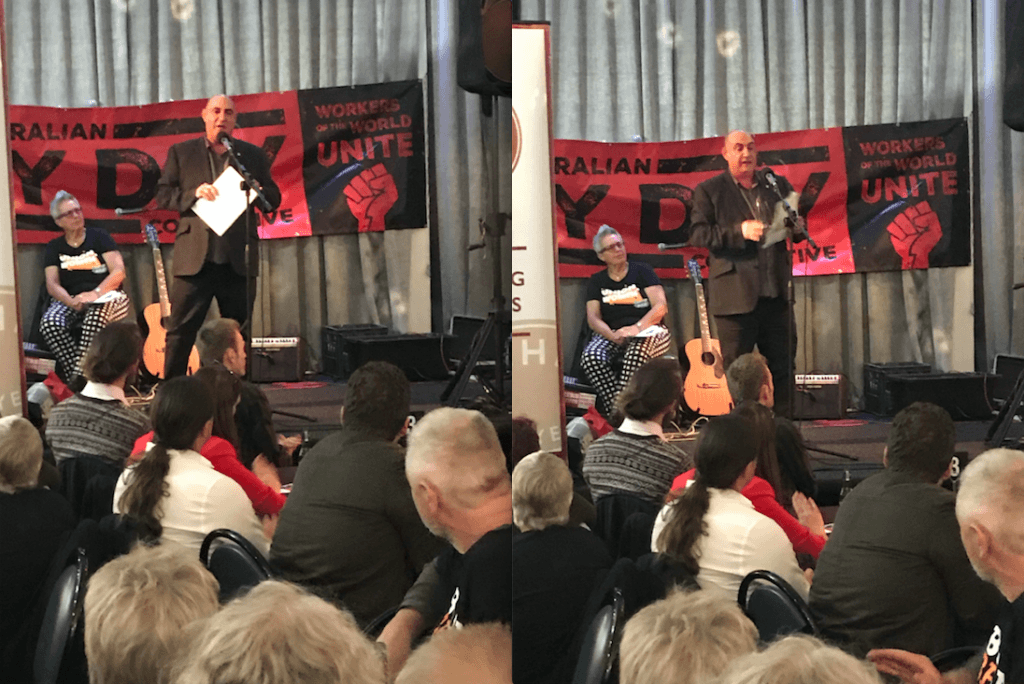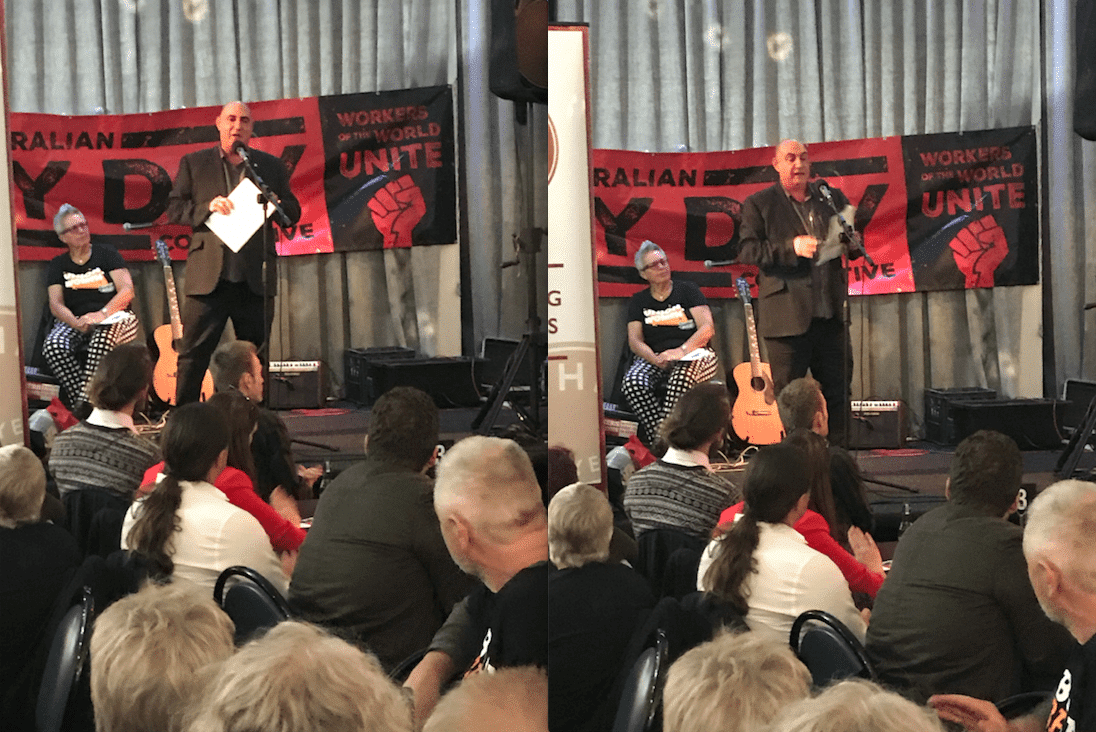The right to hope
May Day Dinner Speech, Adelaide, 01 May 2019
Dr John Falzon
Senior Fellow, Inequality and Social Justice

I would like to begin by acknowledging
that we are reflecting on inequality and social justice
On land that always was, and always will be, Aboriginal land.
I pay tribute to the First Nations Peoples’ spirit
of collective dreaming, collective resistance and collective hope.
We are here because we share a radical belief, a radical idea,
an idea for which we are demonised and calumniated,
An idea that is called radical,
But is actually just common sense.
Our radical idea is that everyone,
everyone,
deserves a fair crack at happiness.
For holding this belief,
We are called all sorts of names,
But in the words of the chant often used by the MUA,
They don’t like us. We don’t care.
Let me add that if they did like us, we should care, we should worry very much,
Because all that they stand for is opposed to the rights of working people,
Because what they stand for is the crushing of working people,
Including the people who have been residualised and excluded from paid work.
In 1996, at the height of the global outbreak of the neoliberal disease,
The year John Howard formed government
French writer, Viviane Forrester wrote, in The Economic Horror:
“A battle is brewing against the excluded.
They really take up too much space…
they are not excluded nearly enough.”
The battle is no longer brewing.
We are in the thick of it.
Neoliberalism was never just an idea.
Just like its partners in social crime,
Patriarchy and colonisation
It is a crusher of souls, a destroyer of lives
A purveyor and extender of exclusion.
Audre Lorde writes that
the master’s tools will never dismantle the master’s house.
If we want to change the master’s rules
We must challenge the master’s story.
The master’s patriarchal story
Normalises and justifies gender inequality
And violence against women
The colonisation story
Normalises and justifies
The ongoing violence against, and dispossession of
First Nations peoples
The neoliberal story
Sprinkles everything with the holy water of liberty and choice.
The dazzling array of consumer choices
Masks the cost of constraint
when it comes to the essentials of life.
The rising tide of profits did not lift all boats.
Some people don’t even have a boat.
They are drowning at sea.
And as for the trickle down myth,
Let me say that I’ve listened long and hard for the sound of the wealth trickling down,
But all I ever hear is the sound of the excluded still waiting.
Now is not the time for hankering after a better time.
Now is the time to say goodbye neoliberalism
And hello to a democratic socialism based on the broadest participation of the People.
Now is not the time for weeping.
Now is the time for building the alternative to neoliberalism.
Now is the time for fighting for this idea, this urgent, deeply human, need.
I want now
Not to mourn what has been lost
Nor to hanker after a past that papered over and sanctioned the exclusion of some
As the price of inclusion of others.
Neither do I wish to dwell on the conscious or confused complicity
Of social democratic parties
As Blairite vehicles for a neoliberal agenda.
I want to reflect on the historical task of organised labour for the 21st century.
Slavoj Zizek reminds us that:
“From ancient Greece,
we have a name for the intrusion of the Excluded into the socio-political space:
democracy.”
It is time for the building of a movement
of all who are excluded from decent work,
from adequate incomes,
from having a place to live,
a place to learn,
a place to heal;
all who are excluded from culture, connection,
community, dignity and respect.
We must move beyond the false divide between the exploited and the excluded.
Precarity is the new industrial norm
But there’s nothing new about precarity.
Ask the maritime workers who walked the Hungry Mile!
Or those who wage a daily struggle to survive on Newstart’s $40 a day,
A payment that has not seen an increase in real terms since 1994.
Whether someone is locked out of paid work or income adequacy,
or locked in to insecure, precarious, poorly paid work
or some form of modern slavery or servitude;
whether someone has lost their job,
or is at risk of losing their job;
we are all in some degree of danger;
some much more than others;
some at the hardest edge,
especially if you are subjected to the triple oppression
of neoliberal capitalism, patriarchy and colonisation.
But we are kidding ourselves if we think that the edge is far away,
in a different world.
Or that any of us can enjoy the privileges that come
with being beneficiaries of the sufferings of others,
without one day paying the social price.
The neoliberal fantasy has seen an unprecedented building of walls,
to keep people out
while providing the highest level of private protection for the privileged.
The notion of the social,
of the common, of shared future and shared responsibility,
has been displaced by an ideological rupture.
Workers are crushed by the attacks on their rights to collectively organise
By the demonisation,
The criminalisation of the union movement
Comrades, the only crime that the union movement is collectively guilty of
Is the crime of having
And giving hope.
Those who break this nation’s heart
Are not those who break unjust laws.
Those who break this nation’s heart
Are those who make unjust laws.
The rules are broken.
The rules, left as they are, will offer safety to no one.
They will only paper over the social crimes
committed against the planet and the people.
Change the Rules is not a polite request for inclusion.
It is an intrusion of the excluded into the socio-political space.
It is a struggle for democracy
in the context of the deeply undemocratic rule by corporate greed.
It is a movement for social democracy,
industrial democracy, economic democracy;
The democratisation of an increasingly undemocratic economy,
a movement for the redistribution of power over resources.
It is the practice, not of exclusion,
but of solidarity, the tenderness of the people.
The false dividing line between people in paid work
and the rest of the working class is being erased by neoliberalism itself.
Precarity, casualistion, sham-contracting
and insecurity have been normalised in the labour market.
A job is no longer a path out of poverty.
In any case there are not enough jobs for the people who need them,
with combined unemployment and underemployment figures
indicating around 1.8 million people looking for work or more work.
The eight hour day, which lies, of course,
at the heart of the history of May Day,
has been all but whittled away.
On the one hand we have a growing number of people
who are unable to work the number of hours they want
while others are forced to work dehumanising numbers of hours
In dehumanising conditions
not out of choice but out of necessity.
We live in an era when the boundary between the hours of work
and the hours of rest and recreation
have been so blurred as to be unrecognisable,
when the hours of rest and leisure
are regularly invaded by the application of technologies that track you,
interrupt you, mould you, hold you, harness you to the job or the gig,
placing you on call
and denying you the space to live, to create, to celebrate, to love,
to heal, to grieve.
As Sharan Burrow puts it: “We live in a fragmented world”.
It is a fragmented world
When the richest 1% own half the world’s wealth
When 1 in 3 women has experienced physical or sexual violence
When the toxic fruits of colonisation are poisoning the lives of First Nations peoples
Only a working class that is truly united
Only a labour movement that is truly inclusive
One that recognises that all struggles for liberation are interconnected
A labour movement that is Wave Hill rather than White Australia
Only this kind of unity can heal our fragmented world
And build a society
Based on the simple principle of
From each according to their ability
And to each according to their need.
This is after all
The principle underpinning a progressive taxation system
And the public provision of social goods.
All this means
Is fairness.
Fairness will not be achieved
by the delusional belief in the market
As being the best guarantor of the essentials of life,
This Blairite dalliance with privatisation.
This utopian capitalism as labourism
Is an adolescent disorder
A classic symptom of our fragmentation
That it is time to grow out of and overcome
Our story can never be erased,
No matter how fragmented it has become.
Working people,
were atomised and shattered by a neoliberalism on steroids
and deeply divided by its Blairite cousin, neoliberalism dressed up as social democracy.
Just as division begets defeat for the working class,
unity is the precondition for victory in our struggle to change the rules.
Working people have been not only economically but politically excluded.
The neoliberal attacks on the public sphere,
ranging from Centrelink to public schools to the public broadcaster,
are proof that excluded still “really take up too much space”
and that what remains of the commons must be carved up and sold off or,
better still, given away to the deserving rich to further enrich themselves.
The champions of inequality hate and loathe the public sphere.
It reeks, to them, of the promise of democracy
The manner in which neoliberalism has been unleashed differs enormously
from the overt violence and repression of fascism.
But the violence of neoliberalism towards labour is no less significant.
As the Uruguayan writer, Eduardo Galeano, puts it so eloquently,
“Blatant colonialism mutilates you without pretense:
it forbids you to talk,
it forbids you to act,
it forbids you to exist.
Invisible colonialism, however, convinces you…
that it’s not possible to speak,
not possible to act,
not possible to exist.”
Comrades, the history of May Day, the history of our movement,
is the history of our resistance to this lie,
it is the history of our declaration of the truth,
our truth, the truth of the working class,
the truth that, collectively,
it is possible to speak,
it is possible to act,
it is possible to exist,
And in our struggle against injustice
The struggle in which
Solidarity is pitted against sadness
The struggle in which humanity is pitted against humiliation
It is possible to win!

